by Kallan Dana
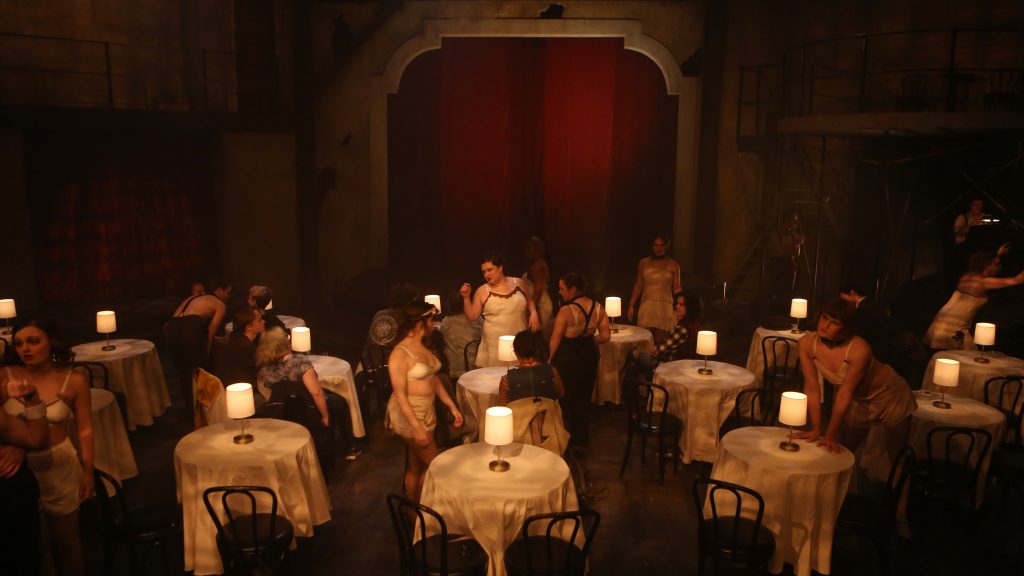
Photo by Sue Kessler
We walk through the backstage dressing rooms, the walls of which are adorned with wide, hanging mirrors. Lascivious dancers heckle and flirt with us as we pass them. We move past the front of the stage, through the club’s café area (the stage floor is covered with two-seat tables, lit by candlelight). We breathe in the smoky air and look through the haze of the venue to see scantily-clad Kit Kat Klub employees wandering around us, surveying and sometimes speaking to us. A band, located on the side of the stage beneath an awning, and led by music director and pianist Casey Reed, plays joyful, jazzy music as the crowd funnels in. The Emcee (Julian Tushabe ’21) steps centerstage, framed in spotlight, and begins the show by singing “welcome,” first in German, then French, then English.
We are not totally untethered from our reality. While some audience members sit at the café tables, directly beneath a small proscenium, the majority are in the same red-cushioned seats that fill up the majority of the JKB mainstage. We see our own modern dress in opposition to the ’20s look of the Kit Kat Klub performers and patrons, all scantily-clad in costume designer Sam Garwood’s pieces: white and cream slips, tight suspenders, vests with nothing underneath. Their pinned-up and slicked-back hairstyles, designed by L. Esther Hibbs ’20, and rouged cheeks and lips (makeup design by Emily Cross ’19 and Megan Muratore ’19) further separate our modern audience from the performers.
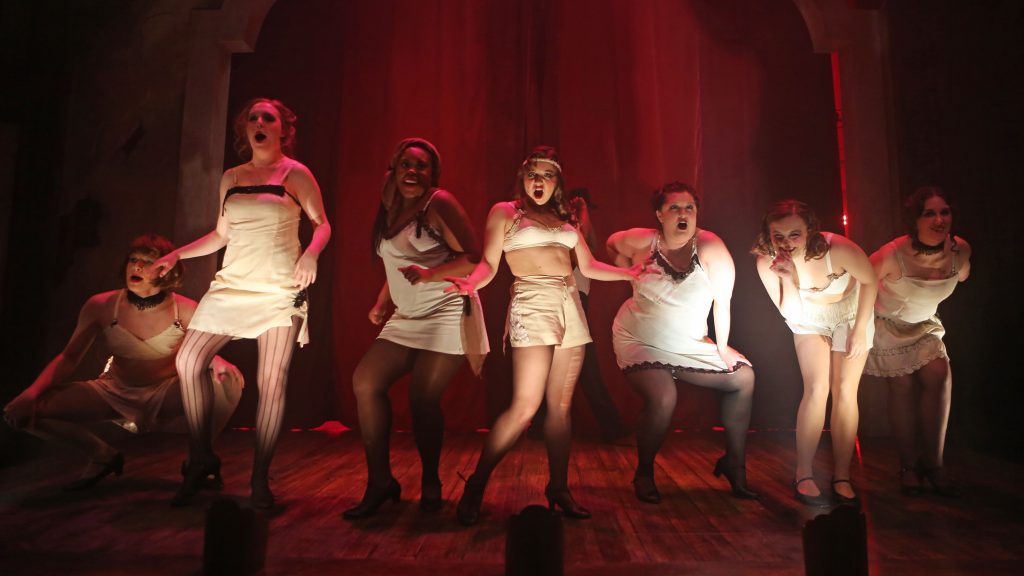
Photo by Sue Kessler
Yet at the same time, the Emcee speaks to us as though we are right there, at the German club, nearly a century in the past, imbibing the delights of the venue and ignoring the outside world. Our oscillating perspective on the performance–we are both watching song-and-dance spectacle numbers in the 1929 Berlin Kit Kat Klub and also witnessing the next plot point in Cabaret the musical–places us in an ambiguous territory. How much should we allow ourselves to be entertained by the musical numbers unfolding? At what points should we be more critical of what we see?
Spliced together with the grand musical numbers set within the Kit Kat Klub are the stories of two intersecting couples. The first is the American writer Cliff Bradshaw (Spencer Evett ’21) and Sally Bowles (Jessie March ’21), British lead singer and showgirl at the club. Both are expatriates, enticed by the thrill of living in Berlin, enjoying the nightlife and scandal of the city. After Max (Caoilin O’Connor ’20) fires Sally from the Kit Kat Club, she barges into the room Cliff is staying in and convinces him and Fraulein Schneider (Annabelle Vaës ’19), the acerbic woman running the boarding house, to let her stay. Fraulein Schneider becomes a member of the second plot-driving couple of the show when the local fruit shop owner, Herr Schultz (Graham Cook ’19), woos her and, in order to preserve her dignity in the face of her boarder and sometimes-nemesis, Fraulein Kost (Bianca Thompson ’19), proposes marriage. As the first act comes to a close, the story seems to be headed for domestic, heterosexual resolutions.
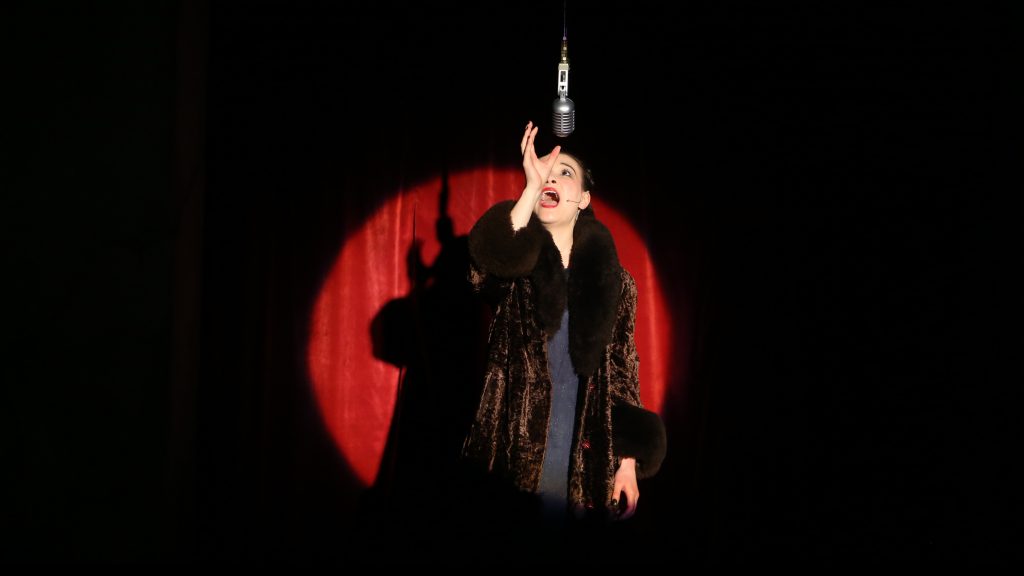
Photo by Sue Kessler
As the couples advance their relationships, the cabaret goes on. Sally and Cliff bicker and banter and fall in love and the Emcee watches them and (with the assistance of the Kit Kat Klub girls and boys) comments on their decisions. The Kit Kat Klub constantly re-inserts itself into the narrative, even when it has no direct bearing on the plot. The songs are invigorating. We can understand why Ernst tells Cliff that the club is “the hottest spot in the city.” The set, designed by Professor Gary Wilson, envelopes the entire mainstage. Tall platforms wrap around the edges of the house, and a small proscenium juts out just in front the cafe tables. The cabaret encloses us, and our relationship to the Kit Kat Klub, our participation in it, becomes more muddled as the show goes on.
We are delighted and entertained by the spectacle before us, by the beaming dancers, their rapid and pointed movements (choreographed by Erika Pujic) and the enticing way they move among us, inviting us to indulge in the same pleasure and immediate gratification as they do. Jared Klein’s lighting makes the cabaret a permanent fixture and allows the numbers to be lavish and bright at one point and then ominous and dark at another, and the live sound mixing by sound engineer Max Helburn ’18 keeps us alert throughout the performance. Yet the disturbing lurks beneath the pleasant, beneath the bright smiles of the performers and the sentimental love stories of the two central couples.
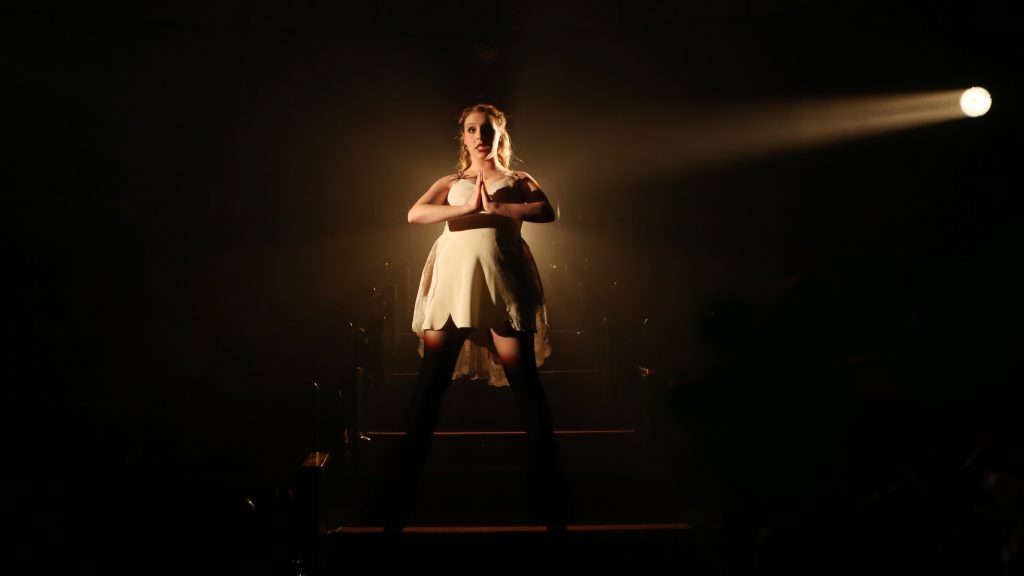
Photo by Sue Kessler
That disturbing something is alluded to as Ernst appears more frequently, constantly referencing his many friends, his desire to be connected, his trips to Paris, his clouded political life. When, at Fraulein Schneider and Herr Schultz’s engagement party, he removes his jacket to reveal a swastika armband, the entire show cracks open. The ensemble bands together and sings “Tomorrow Belongs to Me,” an unsettlingly boisterous Nazi anthem, and we finally see that there is a tomorrow coming, see how easily radicalization occurs.
Throughout the play, characters are eager to separate the personal and the political. When Cliff tells Sally that he is reading Mein Kampf in order to better understand German politics, she giggles, “Why? You’re American!” And even after he has showed the rest of the crowd and the Schneider-Schultz engagement party his Nazi armband, Ernst is quick to chuckle, “Enough politics. We are friends!”
Yet the personal is political, as is clear when Ernst, in spite of what he’d said moments prior, vehemently warns Fraulein Schneider not to marry the Jewish Schultz, warning her that “for her own welfare,” he would advise against the match. “He is not a German,” he insists.
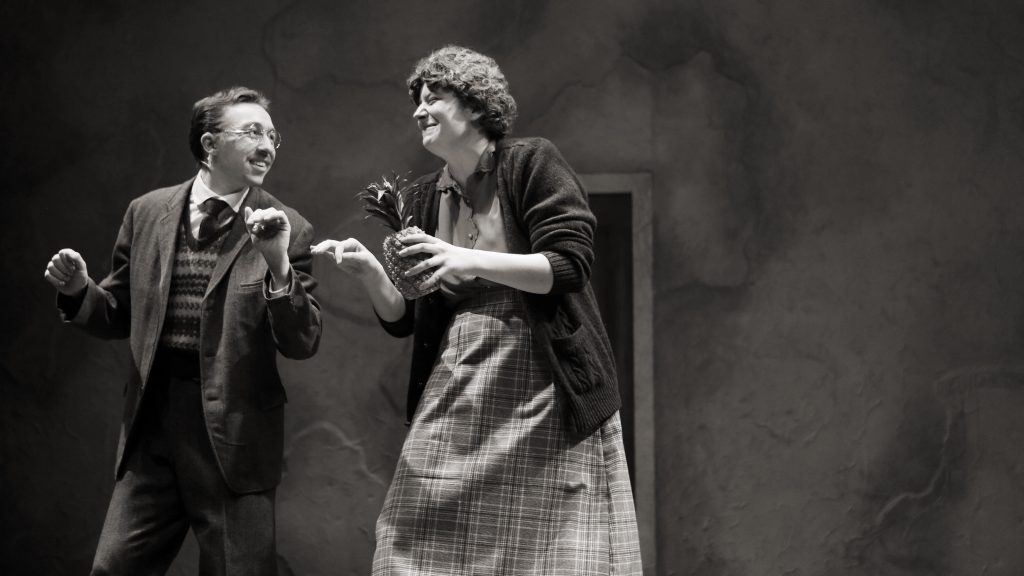
Photo by Sue Kessler
The first act concludes with a striking image, as the Emcee spins Ernst into his arms, dips him, and kisses him. The lights black out and, before there is any time to process, the second act comes in swinging with a vibrant kick line.
Cabaret forces you to react, to participate, even as viewership initially feels passive. The Emcee speaks to us throughout, and while we know how to respond when he cheers “Do you feel good?” to us at the beginning of the show, we are rendered shocked and silent when he points to a Kit Kat Klub dancer in a gorilla suit (Emily Zeller ’22), turns out to us and says “If you could see her through my eyes/She wouldn’t look Jewish at all.”
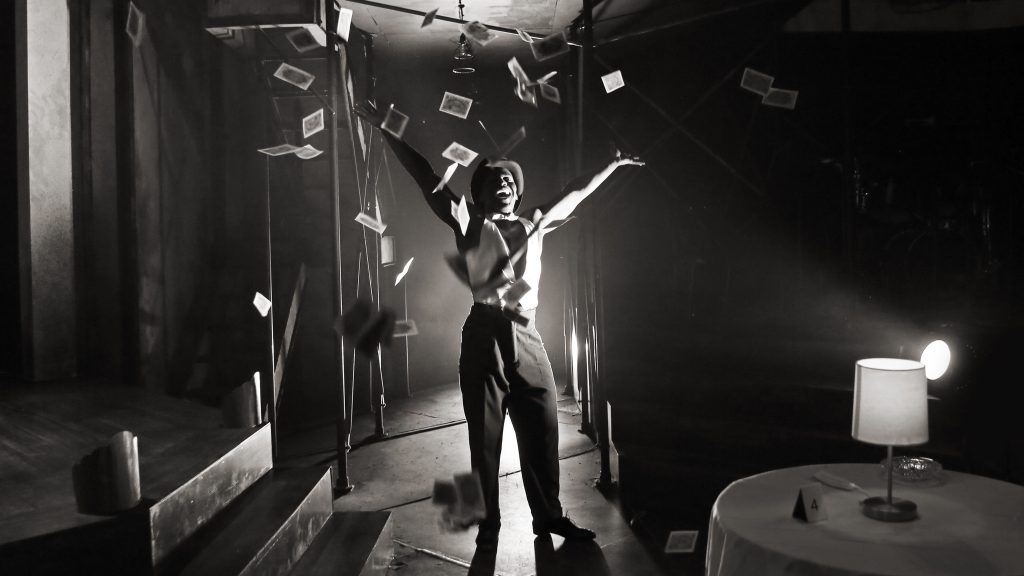
Photo by Sue Kessler
The cabaret goes on. It goes on as Fraulein Schneider breaks off her proposal from Schultz, fearing the direction that Germany is moving, it goes on as Cliff and Sally violently break up their proposal and as he returns to the United States, excising himself from the storm brewing in Berlin. It goes on as Sally returns to the Kit Kat Klub and belts, a panicked and excitable look in her eyes: “Life is a cabaret, old chum/Come to the cabaret!”
Fittingly, for a show that is so grounded in the vitality of live performance, this particular run of the production had its own surprises, including two different actors performing as Sally, and a fire alarm and evacuation during an intermission the first weekend. I saw the production two times, the first with Lulu Fairclough-Stewart ’19, the understudy, as Sally, and the second with the original cast member, Jessie March ’20, playing the part. Each performance was distinct from the other, and not just because of the difference in lead actress. This is a show which forces us to be in the room. It does not offer easy answers or solutions, but instead demands we understand that the personal is political, that pleasure and entertainment are not, after all, so far removed from conflict and turmoil. When the show finally ends just as it begins, with the Emcee alone onstage, we walk away wondering what we partook in, and what happens, happened, in the spaces in between the joyous performance.
PHOTO GALLERY
PRODUCTION CREDITS
Music by: John Kander
Lyrics by: Fred Ebb
Book by: Joe Masteroff
Directed by: John Michael Diresta
Associate Director: Philip Merrick ’19
Assistant Director: Audrey Erickson ’20
Stage Manager: Rebecca Rose Schilsky ’19
Musical Director/Conductor: Casey Reed
Choreographer: Erika Pujic
Scenic Designer: Garett Wilson
Lighting Designer: Jared Klein
Costume Designer: Samantha Garwood
Sound Engineer: Max Helburn ’18
Hair Designer: L. Esther Hibbs ’2
Lighting Designer: Lea Tanenbaum ’19
Makeup Designers: Emily Cross ’19 & Megan Muratore ’19
Cast: Graham Cook ’19 (Herr Schultz), Sophia Bella Cucci ’20 (Rosie/Dance Captain), Geri Cynamon ’22 (Herman), Spencer Evett ’21 (Clifford Bradshaw), Lulu Fairclough Stewart (Lulu & Others/Understudy for Sally), Jonah Harrison ’22 (Heidi), Brendan Higham ’21 (Bobby), Zoe Karch ’22 (Frenchie), Thabi Khumalo ’21 (Texas/Chanteuse), Jessie March ’21 (Sally Bowles), Pat McDevitt ’22 (Hans), Caoilin O’Connor ’20 (Max), Atticus Rego ’21 (Victor & Others), Bianca Thompson ’19 (Fraulein Kost/Fight Captain), Julian Tushabe ’22 (Emcee), Annabelle Vaës ’19 (Fraulein Schneider), Harrison Winrow ’22 (Ernst Ludwig), Emily Zeller ’22 (Helga)
Crew: Jared Klein (Technical Director), James Varkala (Assistant Technical Director), Jessica Thomas (Technical Assistant), Sarah Markley ’19 (Scenic Charge), Jess Goerold (Over-hire Paint), Dennis Strange (Over-hire Carpentry), Patrick Carter ’22 (Assistant Stage Manager), Liliana Mastroianni ’22 (Assistant Stage Manager), Catherine Sullivan ’21 (Props Master), Jessie Hamilton ’20 (C0-Master Electrician), Taylor Jaskula ’21 (Co-Master Electrician), Jolynn Dubois ’19 (Wardrobe Supervisor), Michael Campbell ’22 (Light Board Operator), Emily Hardy ’21 (Sound Board Operator/Associate Sound Engineer), Grace Palmer ’22 (Sound Board Operator), Lucy Holden ’22 (Assistant Hair Designer), Shannon Ambrose ’20 (Assistant Costume Designer), Wynn Lee (Assistant Scenic Designer), Lea Tanenbaum ’19 (Associate Lighting Designer)
***
Kallan Dana ’19 is a senior Editor-in-Chief of the Skidmore Theater Living Newsletter.



























































